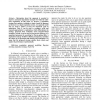Free Online Productivity Tools
i2Speak
i2Symbol
i2OCR
iTex2Img
iWeb2Print
iWeb2Shot
i2Type
iPdf2Split
iPdf2Merge
i2Bopomofo
i2Arabic
i2Style
i2Image
i2PDF
iLatex2Rtf
Sci2ools
122
Voted
IAT
2009
IEEE
2009
IEEE
The Benefits of Opponent Models in Negotiation
Information about the opponent is essential to improve automated negotiation strategies for bilateral multiissue negotiation. In this paper we propose a negotiation strategy that exploits a technique to learn a model of opponent preferences in a single negotiation session. An opponent model may be used to achieve at least two important goals in negotiation. First, it can be used to recognize, avoid and respond appropriately to exploitation, which differentiates the strategy proposed from commonly used concession-based strategies. Second, it can be used to increase the efficiency of a negotiated agreement by searching for Pareto-optimal bids. A negotiation strategy should be efficient, transparent, maximize the chance of an agreement and should avoid exploitation. We argue that the proposed strategy satisfies these criteria and analyze its performance experimentally. Multi-issue negotiation; opponent modelling; Bayesian learning; negotiation strategy; Tit-for-Tat
Bilateral Multiissue Negotiation | IAT 2009 | Intelligent Agents | Negotiation Strategy | Single Negotiation Session |
Related Content
| Added | 16 Aug 2010 |
| Updated | 16 Aug 2010 |
| Type | Conference |
| Year | 2009 |
| Where | IAT |
| Authors | Koen V. Hindriks, Catholijn M. Jonker, Dmytro Tykhonov |
Comments (0)

